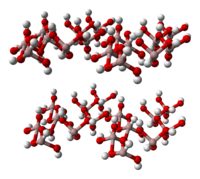
Photo from wikipedia
The object of the research was biodegradable hybrid composites based on poly(vinyl alcohol) (PVA), reinforced with cotton/flax woven fabric and 5–30 phr of chestnut shell powder, a waste filler. The… Click to show full abstract
The object of the research was biodegradable hybrid composites based on poly(vinyl alcohol) (PVA), reinforced with cotton/flax woven fabric and 5–30 phr of chestnut shell powder, a waste filler. The influence of the lignocellulosic particles on mechanical, thermal, and thermomechanical properties of the composites determined in static tensile test, thermogravimetric analysis, and dynamic mechanical thermal analysis and evaluated in reference to the materials’ structures assessed by means of optical microscopy. The analysis was complemented with evaluation of physical properties of the composites, such as density and moisture content. It was found that the hybrid composites present favorable properties and addition of the waste filler does not cause a deterioration of the thermomechanical characteristics of the materials. Utilization of the waste filler for production of the PVA-based composites is consistent with the idea of Circular Economy and also allows to obtain materials with properties comparable with the ones of conventional polymers.
Journal Title: Polymers and Polymer Composites
Year Published: 2020
Link to full text (if available)
Share on Social Media: Sign Up to like & get
recommendations!